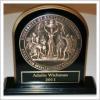The University of Kentucky is joining millions of people around the country in recognizing the 10th anniversary of the 9/11 tragedy. A number of events going on at UK or involving the university will remember and show respect to the victims of that dark day in United States history.
Activities are being conducted by the UK ROTC, the Center for Community Outreach (CCO) and the College of Design.
Beginning at 9 a.m. on Friday, Sept. 9, the UK Pershing Rifles Cadets will conduct their annual memorial vigil for the lives lost on 9/11 at the flag pole on the Administration Lawn,
reading the name of each victim lost in the attacks, as well as posting a small American

















